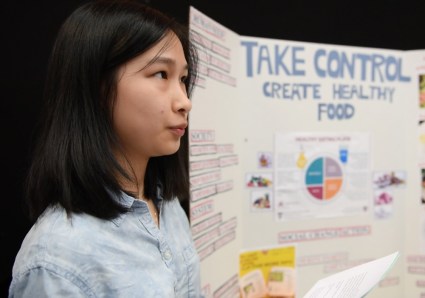Integrative Learning students present on food and hunger

Earlier this month, students from a variety of disciplines presented projects that examined the issue of food and hunger from multiple perspectives. They presented a variety of interesting and thoughtful takes on this difficult problem, including a mock proposal for a community garden plots along Pine Street, evaluations of the effectiveness of food assistance programs, interviews with individuals who had experienced food insecurity and tips for how to purchase healthy foods with limited budgets.
The projects are part of the college’s Integrative Learning program, which encourages students in areas such as English, Geography, English as a Second Language, Environmental Science and Sociology to study complex problems from a variety of perspectives. For the first time, students from both the Culinary and Applied Behavioral Science programs added perspectives to the topic.
“It seemed at least 35 percent of students had experienced food insecurity at some point, which made many of the projects very personal,” said Sociology instructor Greg Hinckley. “Presentations seemed more conversational than in previous quarters and it was nice to have that variety.”
Integrated Learning projects started ten years ago as a complement to the Coordinated Studies Program (CSP), which offers immersive courses on a single topic that incorporate coursework from multiple disciplines. Since some students cannot fit CSPs into their schedule, the idea of Integrated Learning projects was born.